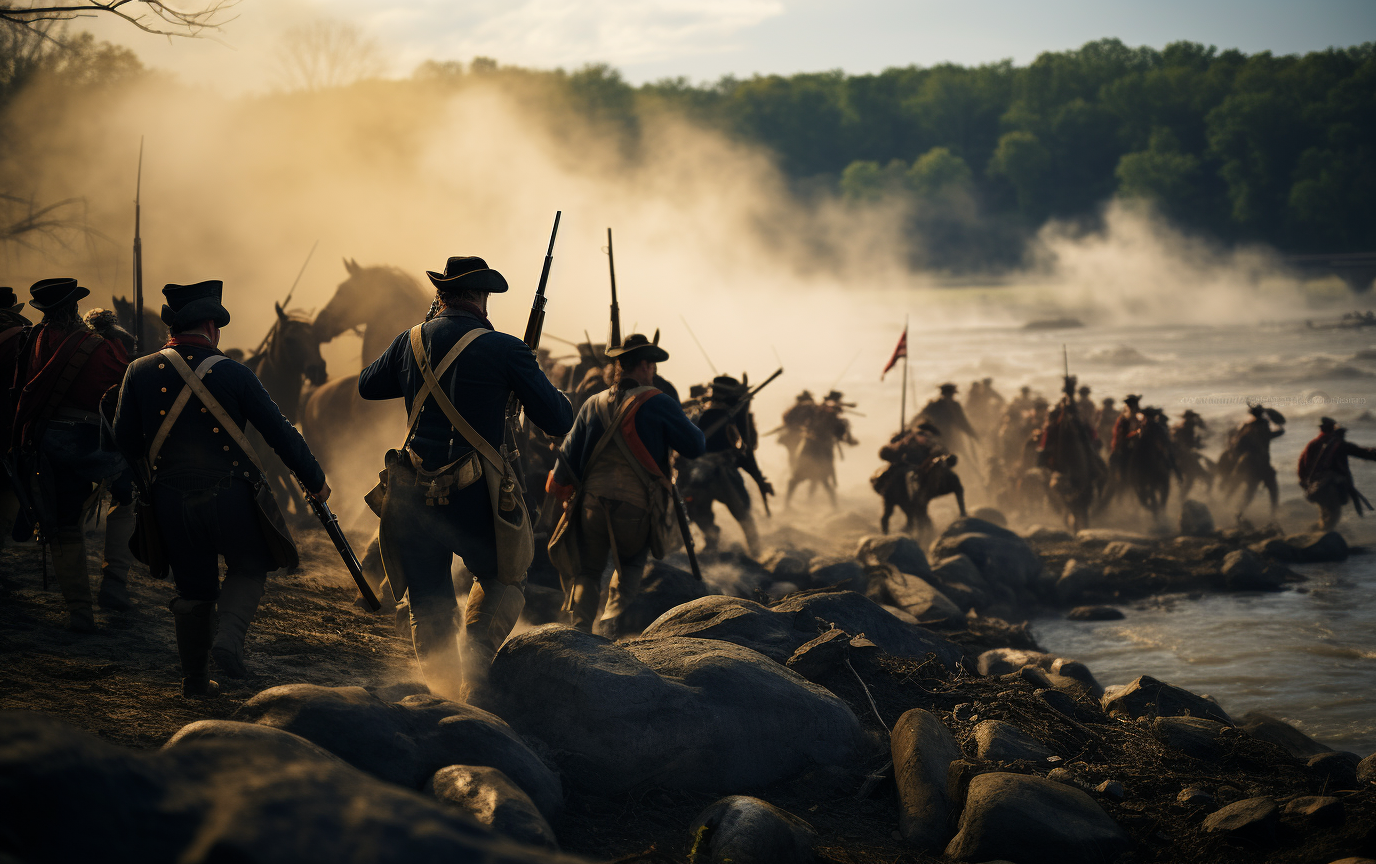
Setting out on a historical expedition, we delve into the complex threads intertwined in two crucial events: the Revolutionary War and the Civil War.
Our goal is to unravel the distinct details that set these conflicts apart, illuminating the key moments that forged the destinies of nations.
Definition of the Conflicts
The Civil War and the Revolutionary War stand as distinct and momentous chapters in the annals of history, each weaving its own narrative and bearing profound significance.
- Read also: Who Discovered America? The History That You Probably Haven’t Heard
- Read also: What Was the Shortest War in History
Revolutionary war
The Revolutionary War unfolded between 1775 and 1783, a critical period that witnessed the fervent struggle of the thirteen American colonies to break free from the shackles of British rule.
This monumental conflict marked the genesis of a new nation—the United States of America.
Characterized by the unyielding spirit of rebellion and an unwavering pursuit of liberty, the war laid the foundation for the principles that would shape the fledgling nation’s identity.
It was not merely a military confrontation; it was a transformative journey that birthed a collective aspiration for freedom and self-determination.
Civil war
Fast forward to the mid-19th century, and the Civil War emerged as a bitter internal struggle within the United States, spanning from 1861 to 1865.
This conflict was a crucible that tested the nation’s cohesion, pitting states against each other in a profound dispute over issues that included slavery, states’ rights, and the very preservation of the Union.
At its core, the Civil War was a poignant clash of ideologies and regional identities.
The question of whether the United States would endure as one nation or splinter into divided entities hung in the balance.
The scars of this conflict ran deep, leaving an indelible mark on the nation’s history and altering its trajectory.

What are the differences and similarities between a war and a civil war?
To comprehend the distinctions and commonalities between wars and civil wars, let’s break down the key elements.
Differences
| Aspect | Revolutionary War | Civil War |
| Cause | Quest for independence from a foreign power |
Internal conflicts within the nation
|
| Scale | Involves a struggle for a new nation |
A conflict within an existing nation
|
| Goals | Establishment of sovereignty |
Preservation or alteration of the Union
|
Similarities
| Aspect | Revolutionary War | Civil War |
| Violence | Armed conflicts and battles |
Military engagements and warfare
|
| Impact on Society | Social upheaval and political change |
Profound societal and political shifts
|
Strategies and Tactics

The strategies and tactics employed in the Revolutionary and Civil Wars were intricately shaped by the distinctive circumstances of each conflict, showcasing the adaptive nature of military planning during these transformative periods.
Revolutionary war
During the Revolutionary War, the Continental Army, led by figures like George Washington, confronted the superior British forces with a clever use of guerrilla warfare and unconventional tactics.
Aware of the advantage provided by their intimate knowledge of the local terrain, American forces engaged in hit-and-run tactics, ambushing the British in unexpected places.
This asymmetrical approach allowed the Continental Army to offset the British military might, turning the vast American landscape into a strategic asset.
The use of unconventional warfare became a hallmark of the American Revolutionary strategy, emphasizing resourcefulness and adaptability in the face of formidable odds.
Civil war
Moving forward to the Civil War, military tactics underwent a significant evolution to meet the challenges posed by the internal strife tearing the nation apart.
Trench warfare, reminiscent of later conflicts like World War I, became a notable feature, as soldiers dug in to defend strategic positions.
Naval blockades played a crucial role in the conflict, impacting the South’s ability to trade and receive essential supplies.
The emergence of railroads as a means of strategic transport transformed the logistics of warfare, enabling swift movement of troops and supplies across vast distances.
Legacy and Impact

The enduring impact of the Revolutionary and Civil Wars extends far beyond the temporal boundaries of the conflicts, shaping the trajectory of nations and leaving a profound imprint on the course of history.
Revolutionary war
The Revolutionary War stands as a watershed moment in history, leaving an indelible legacy through the birth of the United States of America.
The conflict’s profound impact reverberates in the foundational principles of democracy and individual freedoms upon which the nation was established.
The Revolutionary War not only secured the independence of the thirteen American colonies but also set a powerful precedent for other liberation movements worldwide.
The idea that a determined populace could overcome imperial rule fueled aspirations for self-determination across the globe, inspiring future generations to strive for freedom and autonomy.
Civil war
The legacy of the Civil War is multifaceted, reflecting the complexity of a conflict that tore at the fabric of the nation.
The most notable outcome was the abolition of slavery, a monumental step towards fulfilling the promise of equality enshrined in the nation’s founding documents.
The Emancipation Proclamation, issued by President Lincoln in the midst of the war, signaled a moral imperative against the institution of slavery, setting the stage for the subsequent ratification of the 13th Amendment.
- Read also: Exploring the Rich Celtic Warrior Culture
- Read also: The Most Famous Historical Figures
Conclusion
When we examine the Revolutionary War and the Civil War, we discover the complex web of historical events that shaped nations.
Each of these conflicts, influenced by its own unique circumstances, has played a role in weaving the intricate narrative of human resilience and the pursuit of ideals.
Through a deeper understanding of these wars, we gain valuable insights into the forces that have shaped our present-day world.



